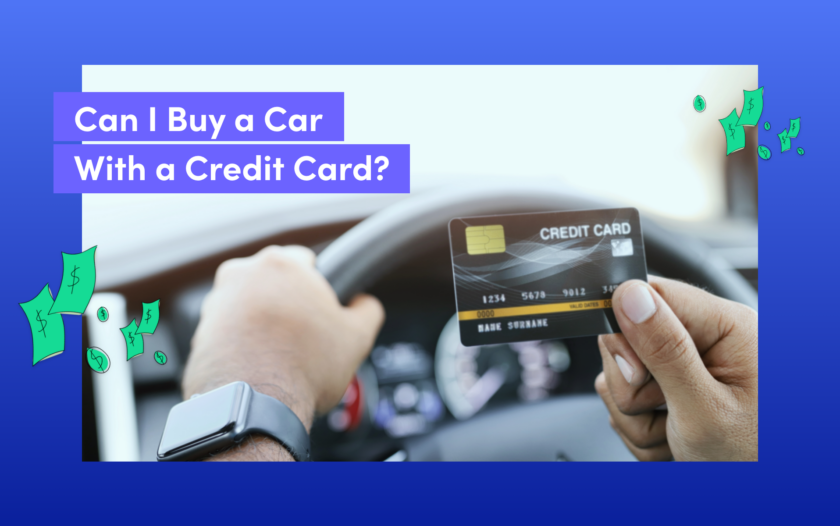Buying a Car With a Credit Card
About Harrison
Harrison Pierce is a writer and a digital nomad, specializing in personal finance with a focus on credit cards. He is a graduate of the University of North Carolina at Chapel Hill with a major in sociology and is currently traveling the world.
Read full bio
At a Glance
Purchasing a car using a credit card is an option that comes with both advantages and potential pitfalls. While it might seem like a convenient way to make a significant purchase, there are several factors to consider before deciding to use your credit card for such a substantial expense. Let’s discuss the intricacies of buying a car with a credit card, exploring its feasibility, benefits, drawbacks, and alternative options.
In this article, you’ll learn:
$48,008
The average cost of a new car as of March 2023.


Do car dealers accept credit cards?
One of the initial questions that may come to mind is whether car dealers accept credit card payments. The answer varies from dealer to dealer. While some car dealerships do accept credit card payments, others may not due to transaction fees and potential risks associated with large credit card transactions. It’s essential to inquire with the specific dealership you’re interested in to determine their payment policies.
How to buy a car with a credit card?
1. Check with the credit card issuer
Before proceeding with a credit card purchase, it’s crucial to contact your credit card issuer and inquire about the possibility of using your card for a car purchase. They can provide valuable information about transaction limits, fees, and any special conditions associated with such transactions.
2. Research sellers who accept credit cards
If your credit card issuer permits a car purchase, research dealerships that accept credit card payments. This might involve some extra effort, but it can save you time and disappointment down the line. Look for reputable dealerships with a history of accepting credit card payments.
3. Consider the potential risks
Buying a car with a credit card comes with risks. Credit card transactions are subject to interest rates, and if you can’t pay off the balance promptly, you could accumulate significant debt. Additionally, some dealerships might charge an additional fee for credit card transactions, impacting the overall cost of the car.
4. Make a plan to pay off the balance
Before using your credit card for a car purchase, create a solid plan to pay off the balance. Carrying a large balance on your credit card can lead to high-interest charges, affecting your financial stability. Ensure that you have a repayment strategy in place to avoid unnecessary debt.
Is it a good idea to buy a car with a credit card?
While there are potential risks associated with buying a car using a credit card, there are also some potential benefits.
1. Credit utilization ratio
Using a credit card for a car purchase can impact your credit utilization ratio—the amount of credit you use compared to your total credit limit. Maintaining a low credit utilization ratio can positively influence your credit score.
2. 0% intro APR
Some credit cards offer a 0% introductory APR (Annual Percentage Rate) for a certain period. If you have access to such an offer and can pay off the balance within the introductory period, you could potentially avoid paying interest on the car purchase.
3. Rewards potential
Certain credit cards offer rewards programs, such as cashback or travel rewards, which could provide added value to your car purchase. This could be a beneficial option if your credit card offers attractive rewards and you can pay off the balance promptly.
Should you buy a car with a credit card?
The decision to buy a car with a credit card depends on your financial situation, goals, and risk tolerance. It’s important to weigh the potential benefits against the risks and ensure that you have a solid plan in place for repayment.
How to buy a car without a credit card?
If using a credit card for a car purchase doesn’t align with your financial strategy, there are alternative options to consider.
1. Consider car financing
Car financing involves securing a loan from a bank, credit union, or financial institution to purchase the car. This option allows you to make monthly payments over a set period, spreading out the cost of the car.
Learn more: Best Personal Loans to Buy a Car
2. Find a cosigner
If you’re struggling to secure car financing on your own, finding a cosigner with a strong credit history could help you secure a loan with more favorable terms.
3. Try using cash
Paying for a car in cash eliminates the need for credit. If you have the financial means, this could be a straightforward way to purchase a car without incurring debt.
4. Trade in your current car for a down payment
If you currently own a car, trading it into the dealership can provide a down payment, reducing the amount you need to finance.
FAQs
In some cases, dealerships may allow you to use a credit card for a portion of the down payment. However, it’s essential to confirm this with the specific dealership, as policies vary.
Buying a car with a credit card can lead to high-interest charges and potential debt if the balance isn’t paid off promptly. Additionally, some dealerships may charge transaction fees for credit card payments.
When assessing your eligibility for car financing, car dealers typically consider your overall financial situation, including credit card debt.
Yes, making consistent and timely payments on a car loan can positively impact your credit score over time.
There isn’t a specific limit for buying a car. Your credit card issuer determines your overall credit limit based on factors like your credit history, income, and credit utilization.









